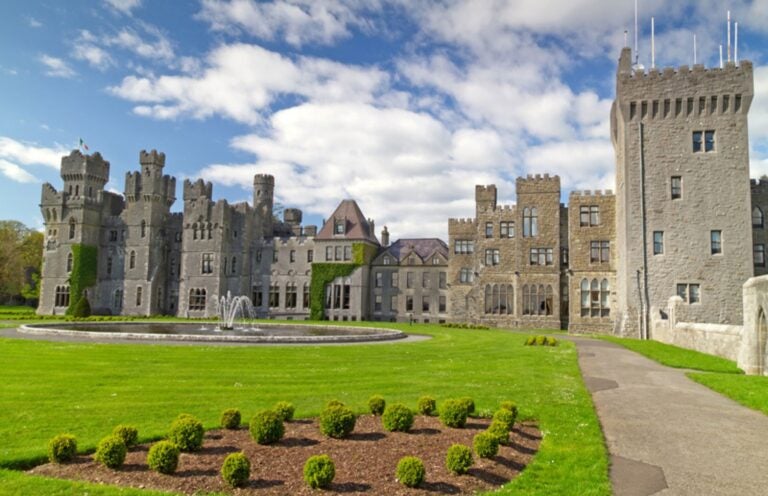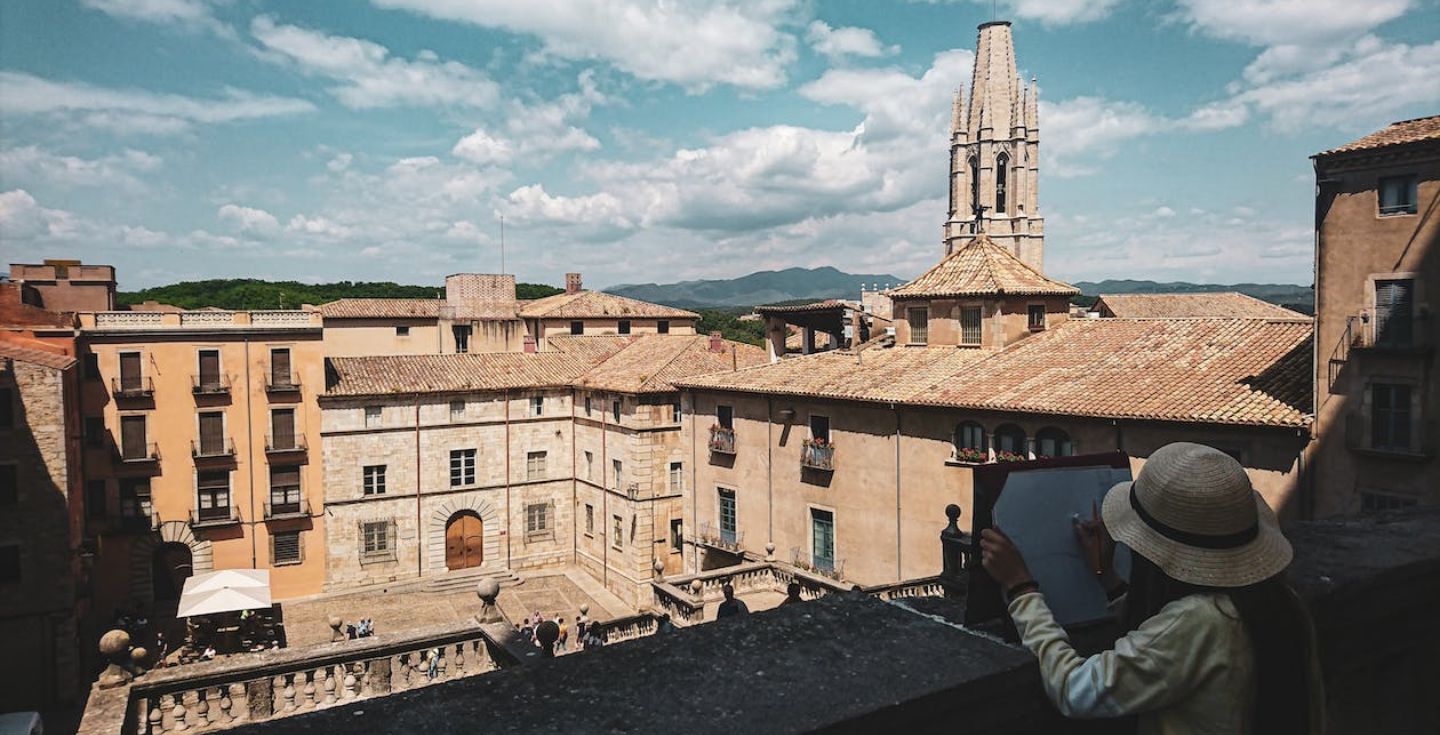Getting married in Ireland: How to plan a dream wedding abroad
Getting married in Ireland? Learn about legal requirements, the marriage registration form, top venues, costs, and how to plan a civil or religious ceremony abroad.
Did you know that ancient Irish couples could enter a ‘trial marriage’ for a year and a day before deciding to stay together? No paperwork, no courts—just walk away if it didn’t work out. Today, getting married in Ireland takes a little more planning and a lot more paperwork, but it’s definitely worth it.
From marriage registration forms to choosing a stunning venue, this guide covers everything you need to know about planning a marriage in Ireland, whether it’s a religious or civil ceremony.
Why get married in Ireland?
Many couples look into Ireland for their destination wedding, because it offers a storybook setting with historic castles, dramatic cliffs, and charming countryside estates. Whether you dream of a ceremony in a grand manor or a wedding in a centuries-old chapel, you will find the perfect venue.
For those with Irish heritage, a wedding in Ireland can be a way to honor family traditions, from exchanging Irish wedding vows to getting a wedding ring with the traditional Claddagh symbol.

Others choose Ireland because the process is simpler than many expect. Irish law allows foreign nationals to legally marry in Ireland with proper legal documents, including a marriage registration form and a marriage notification appointment at a civil registration office.
And if you’re wondering, can Americans elope in Ireland? Absolutely! In addition to secluded landscapes and intimate venues, Ireland marriage laws allow couples to elope with minimal restrictions, whether you prefer a coastal retreat or a hidden countryside chapel.
Legal requirements for getting married in Ireland
Before saying “I do,” couples must meet Ireland’s legal marriage requirements. This includes submitting documents and registering the marriage ceremony in advance.
- Who can marry? Both foreign nationals and Irish citizens can get married in Ireland through a civil ceremony, religious or secular ceremony, or humanist ceremony.
- What documents are needed? A new marriage registration form, passports, birth certificates, and proof of marital status. Additional paperwork may be required for a civil partnership or remarriage.
- How soon should you apply? A marriage notification appointment must be scheduled at least three months before the marriage date, and both partners must attend in person to sign a declaration. The non-refundable fee is €200.
- Where do you register? Marriage notifications must be submitted in person at a civil registration office. Couples living abroad can arrange this with Irish authorities.
- How quickly can you get married? After the three-month notice period and approval of documents, couples can proceed with their ceremony once they receive their marriage registration form and Irish marriage certificate. The marriage registration form is valid six months from the intended marriage date.
- What if you need to change your marriage date? If the new marriage date falls within six months, the form can be amended. If the new date is beyond six months, couples must apply for a new marriage registration form but do not need to pay again.
- Who can perform the ceremony? A solemniser registered in Ireland must perform the marriage ceremony. This can be a registrar for civil ceremonies or an approved secular or religious body for other types of weddings.

| NOTE: Foreign nationals or couples where one partner is from outside the EU may need to attend an interview with a registrar. If a marriage is suspected to be solely for immigration benefits, a marriage license will not be issued. |
Best wedding venues in Ireland
From romantic castles to breathtaking cliffside locations, Ireland offers stunning scenery for every type of ceremony. So, Where to get married in Ireland? Here are some interesting choices:
- Romantic castles and estates: Host a fairytale wedding in Kilronan Castle, Ashford Castle, or Ballymagarvey Village, where history meets luxury.
- Cliffside and countryside: Exchange wedding vows along the Cliffs of Moher, in a secluded countryside manor, or at a charming lakeside retreat.
- City weddings: Contact one of Dublin’s elegant venues or the historic charm of Galway’s cathedrals and townhouses for a stylish civil ceremony.
While many of the venues will have videos showcasing them, it’s best if you travel to Ireland to see them in person. Castles and remote locations may require planning in advance, so pick a base, like Dublin, get an eSIM, and coordinate viewings from there.

How to plan your dream wedding in Ireland
A well-planned marriage ceremony allows you to enjoy your special day, knowing everything is going as planned. Start packing for Ireland and follow these steps to make getting married in Ireland smooth and memorable.
Step 1: Set your budget
The cost of getting married in Ireland varies widely, but on average, weddings range from €15,000 – €35,000 ($16,000 – $38,000 USD). A castle wedding can cost €30,000 – €80,000+, while an intimate civil ceremony in a registration office may be as low as €1,500 – €3,000.
Key expenses include:
- Venue: €5,000 – €20,000
- Catering (per guest): €50 – €150
- Photographer: €1,500 – €3,500
- Marriage registration form and fees: €200 – €400
- Marriage certificate: €20
Those planning a civil partnership or elopement can significantly reduce costs by choosing off-season dates or smaller venues. Keep in mind that these are just estimates. You must also take into account that there will be some additional costs, such as taxi rides, an eSIM to stay in touch, and other daily expenses while you plan.
Step 2: Pick the right season
Ireland’s weather is unpredictable, so choosing the right season for your marriage ceremony depends on your preferences for climate, cost, and availability.
Spring (March–May): You can count on lush green landscapes and mild temperatures between 10–15°C (50–60°F). The longer daylight hours make it a beautiful time for outdoor weddings, but rainfall is still frequent, and some countryside venues may be muddy.
Summer (June–August): This is the warmest time of the year, with temperatures ranging from 15–22°C (60–72°F) and daylight lasting up to 18 hours. It’s the best season for outdoor weddings, but it’s also the most expensive. Registration offices, venues, and vendors book up quickly, and prices are higher due to peak tourist season.
Autumn (September–November): This time is ideal for couples who want a quieter, more affordable wedding. The golden landscapes create a jaw-dropping setting, and fewer tourists mean better availability for venues and vendors. However, temperatures drop to 8–15°C (46–60°F), daylight hours shorten, and weather conditions become more unpredictable.
Winter (December–February): Generally, this is the least popular wedding season but offers lower venue costs and better availability in civil registration offices. Indoor weddings in castles or historic venues create an intimate atmosphere, but cold temperatures between 2–8°C (35–46°F) and limited daylight make outdoor ceremonies difficult.

Step 3: Book your venue and officiant early
Popular wedding venues in Ireland, especially castles, coastal retreats, and city locations, book up quickly. Secure your marriage date at least 12 months in advance.
If opting for a civil ceremony, arrange your marriage notification appointment at a civil registration office early. Some venues require couples to use their in-house officiants, while others allow you to bring your own religious or secular representative.
Step 4: Sort out travel and accommodations
For destination weddings, organizing travel and accommodations is key. Many couples book group rates for hotels and flights to make it easier for guests. If your guests are flying in, they may need help navigating, so recommend the eSIM for Ireland so they can find their way more easily.
Step 5: Hire local vendors
Local photographers, florists, and planners are familiar with the best wedding spots and local customs. Whether planning an Irish wedding in a castle or city hall, hiring experienced vendors ensures a smoother event.
For a civil ceremony, check with the civil registration office about officiant requirements. If you’re planning a religious or secular ceremony, ensure the religious or secular body meets Irish marriage regulations. Booking vendors early prevents scheduling conflicts and last-minute stress.
Pro tip: Stay connected while planning
The quality of communication can make or break your planning when you’re having a wedding abroad. Stay in touch with vendors, guests, and family members—especially for last-minute adjustments. An eSIM for Ireland from Holafly allows couples and guests to stay connected without worrying about roaming charges.
Whether finalizing details with a civil registration office, coordinating with your marriage ceremony officiant, or confirming guest arrivals, being able to stay connected makes things so much easier. Staying connected means staying on top of things. It helps avoid miscommunication and prevent tiny mishaps along the way.
If you are lucky enough to be able to stay in Ireland for several months for venue viewing, cake tasting, and all the other wonderful things that come with wedding planning, you’ll need a reliable internet connection to do your research and contact vendors. Holafly Connect is the best way to go. It’s a monthly eSIM plan that will make an internet connection available to you instantly, and you can share it with other devices.
Key takeaway
Planning a marriage ceremony in Ireland means meeting legal requirements, including submitting a marriage registration form and attending a marriage notification appointment at a civil registration office at least three months before the marriage date.
Booking venues, vendors, and accommodations in time is key, especially if you’re hoping to get married in the summer, as Ireland is a wonderful place to tie the knot. For couples managing plans from abroad, a Holafly eSIM makes it easy to stay connected with vendors and guests.





 Language
Language 


















 No results found
No results found














